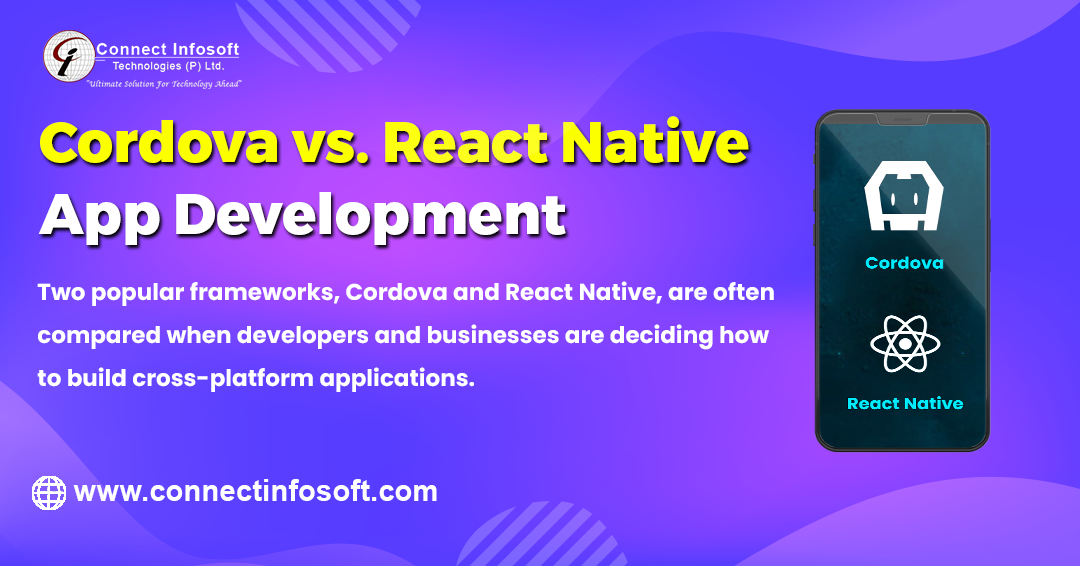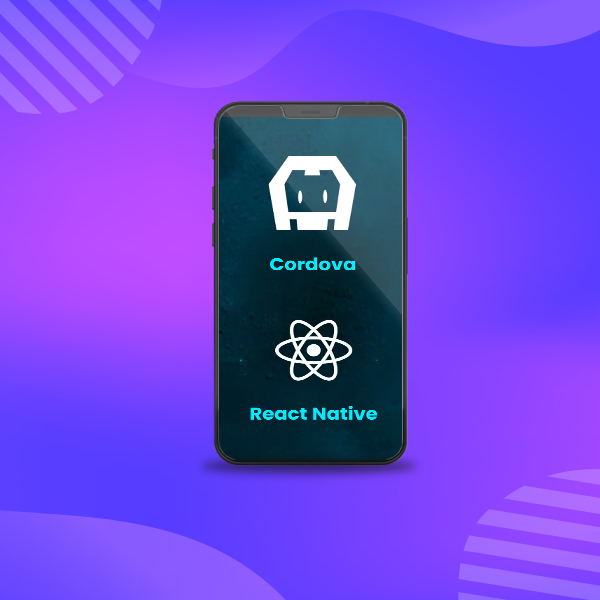Cordova vs. React Native App Development: Which Is Best for You?

In the world of mobile app development, choosing the right framework can make all the difference in terms of performance, user experience, and development efficiency. Two popular frameworks, Cordova and React Native, are often compared when developers and businesses are deciding how to build cross-platform applications. At Connect Infosoft, we understand that making this choice requires careful consideration of project requirements, budget, and long-term goals.
Here, we will do a comparison of Cordova vs. React Native to assist you in determining the best framework to use based on your requirements.
What is Cordova?
Apache Cordova is an open-source mobile app development framework that allows web developers to create cross-platform mobile applications with the help of HTML, CSS, and JavaScript. It allows web applications to execute inside a native WebView wrapper, closing the gap between web and mobile platforms via plugins.
Key Features of Cordova:
- Web-based technology (HTML, CSS, JavaScript)
- Javascript-based architecture to access native device features
- Single codebase for all platforms
- Supports a wide range of third-party plugins
What is React Native?
React Native is an open-source platform created by Facebook that enables developers to develop cross-platform mobile apps with JavaScript and React. In contrast to Cordova, React Native does not use WebView but renders UI elements through native components, thus offering a much better performance.
Key Features of React Native:
- Native components to achieve high performance
- Both JavaScript and TypeScript supported
- Hot-reloading functionality to improve development
- Huge community and wide range of libraries
Comparison: Cordova vs. React Native
1. Performance
Performance is one of the primary differences between these two frameworks.
- Cordova: Because Cordova applications run within a WebView, performance could be impacted in the case of complex animations, heavy calculations, or high responsiveness.
- React Native: React Native natively renders UI components, resulting in significantly improved performance and a more seamless user experience, thus making it the performance-intensive app's better option.
2. Development Speed and Convenience
- Cordova: Provides a quicker development cycle for web developers who are already comfortable with HTML, CSS, and JavaScript. Debugging and optimization are, however, tricky because of WebView constraints.
- React Native: Learning curve for users not used to React, but hot-reloading capability and huge library ecosystem support improve its speed of development.
3. User Interface and User Experience
- Cordova: Relies on WebView, meaning the UI feels more like a web application rather than a native app.
- React Native: Gives a native-like experience by rendering UI elements as native components, giving native transitions and interaction feel.
4. Support for Third-Party Library and Plugins
- Cordova: Great plugin support for accessing native device capabilities, but compatibility problems can occur due to old or unsupported plugins.
- React Native: Rich third-party library ecosystem and great integration with native modules.
5. Platform Support and Community
- Cordova: Multi-platform support, such as Android, iOS, Windows, and even desktop apps.
- React Native: Mostly supports iOS and Android, with increasing support for other platforms via community contributions.
Both platforms share big communities but React Native benefits from a bigger and more rapid-growing developer ecosystem.
6. Scalability and Maintenance
- Cordova: Quicker to manage small-sized projects but potentially will struggle when scaling and performance optimization, in the long run, needs to be made.
- React Native: Provides good scalability, being an excellent pick for enterprise-based applications with a long-term expansion plan.
When to Choose Cordova?
Cordova is a great choice if:
- You already have a web-based application and want to convert it into a mobile app quickly.
- Your app does not require heavy animations or advanced UI interactions.
- You need to support multiple platforms beyond Android and iOS.
- You have a small budget and need a cost-effective solution.
When to Choose React Native?
React Native is ideal if:
- You need a high-performance, native-like experience.
- Your app requires complex animations and interactions.
- You want to scale your app with long-term growth.
- You are targeting Android and iOS as primary platforms.
Conclusion: Which One is Best for You?
Both Cordova and React Native have their pros and cons. If you're searching for a cheap and fast fix for basic apps, then Cordova is an excellent option. However, if performance, user experience, and scalability matter most to you, then React Native is the option.
At Connect Infosoft, we specialize in Cordova and React Native app development. We help businesses build mobile applications that align with their goals. If you're still unsure which framework to choose, contact us today, and our experts will help you determine the best approach for your project!
Get in touch with Connect Infosoft for expert mobile app development services!


